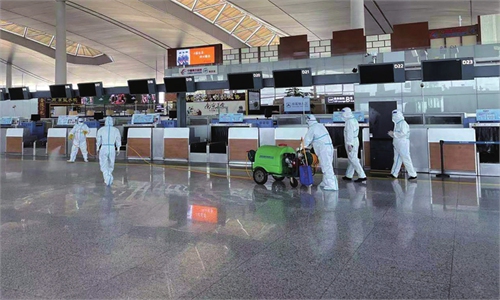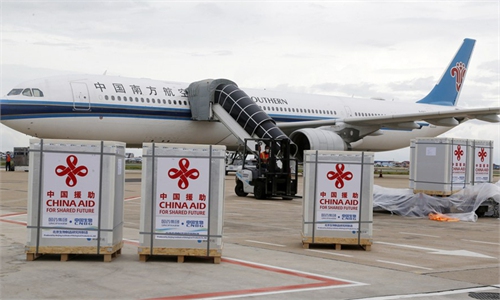
Photo:Xinhua
A total of 17 airport workers at the Nanjing Lukou International Airport in East China's Jiangsu Province tested positive for COVID-19 as of Wednesday noon. The source of the outbreak is still being traced, with the possibility of being initiated by imported infection cases, a local official said at a press conference on Wednesday.
Since Nanjing, capital of Jiangsu Province, is an important hub city in one of China's most economically vibrant regions, the sudden resurgence of the new COVID-19 cases is causing concern among the domestic public.
While COVID-19 vaccines have been rolled out worldwide, new variants of the virus have also been identified in many countries. After learning recently about how rapidly the Delta variant has been spreading in some Southeast Asian countries, some in China have already been concerned about the severity of the recent outbreak in neighboring countries.
Concern multiplies at a time when new infection cases were found in a busy international airport with consistent flow of people. The latest development also has many wondering whether the relevant entry quarantine requirements will be tightened to curb risks of imported infection.
At present, efforts are being made to bring the outbreak under control as soon as possible in accordance with various contingency plans. According to the latest news, Nanjing will launch a citywide testing for all residents.
Nanjing also urged on Wednesday its residents not to leave the city unless necessary, and they need to provide negative results of COVID-19 test within 48 hours before departure. A large number of flights at the airport were also canceled on Wednesday.
Yet, it remains to be seen how the outbreak will develop and what impact it will have on future anti-epidemic measures.
To a certain extent, the spread of the more contagious variants is bound to put on more pressure for China's prevention and control of imported infection risk, generating impact on the relevant economic and trade activities and international personnel exchanges.
Under the current circumstances, it is totally understandable for the public to have some concern about the severity and contagion of the new variants of the virus, which requires more efforts by the relevant authorities to respond more efficiently to the new anti-epidemic situation.
In the meantime, it is also worth noting that the pandemic is still going on in many parts of the world, which is unlikely to end any time soon. The foreign ministry spokesperson Wang Wenbin said in early July that in light of the evolving global situation, China will decide on prevention and control measures in a coordinated way based on science and professional advice with a responsible attitude towards the life and health of Chinese and foreign citizens.
In this sense, China needs to seek a balance between curbing the risk of imported infection and maintaining the normal flows of goods and people with the rest of the world.



